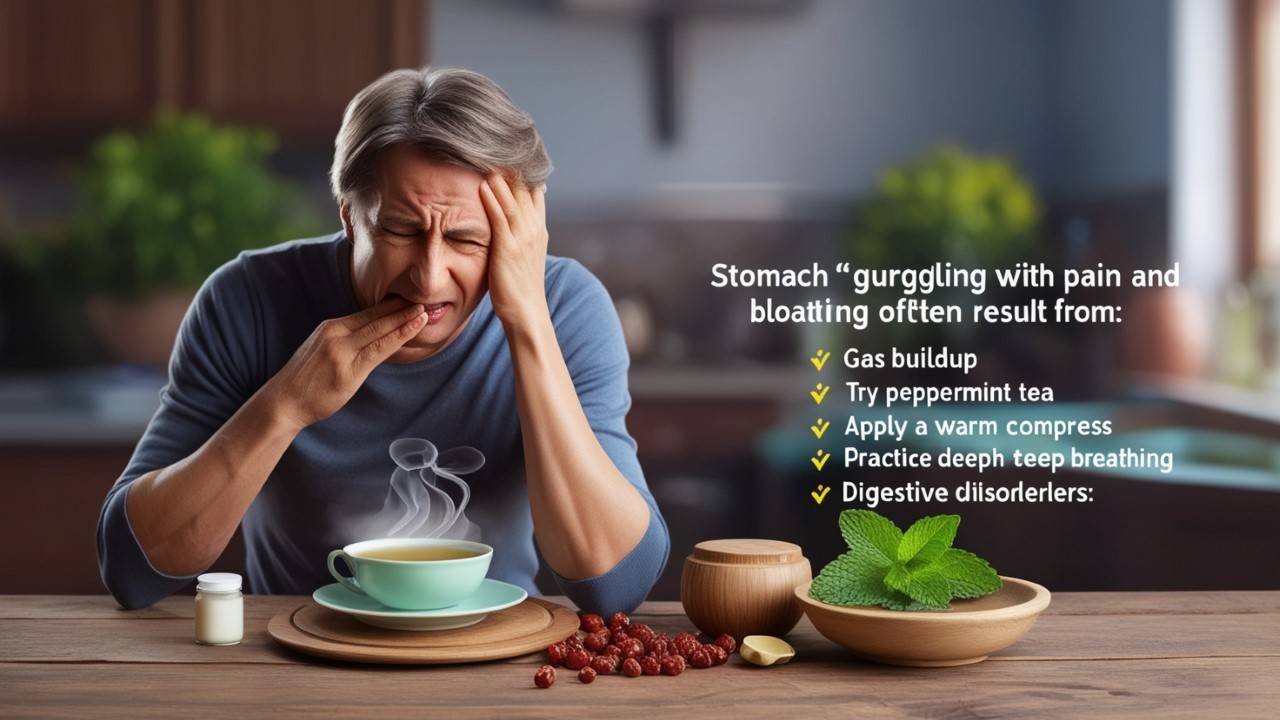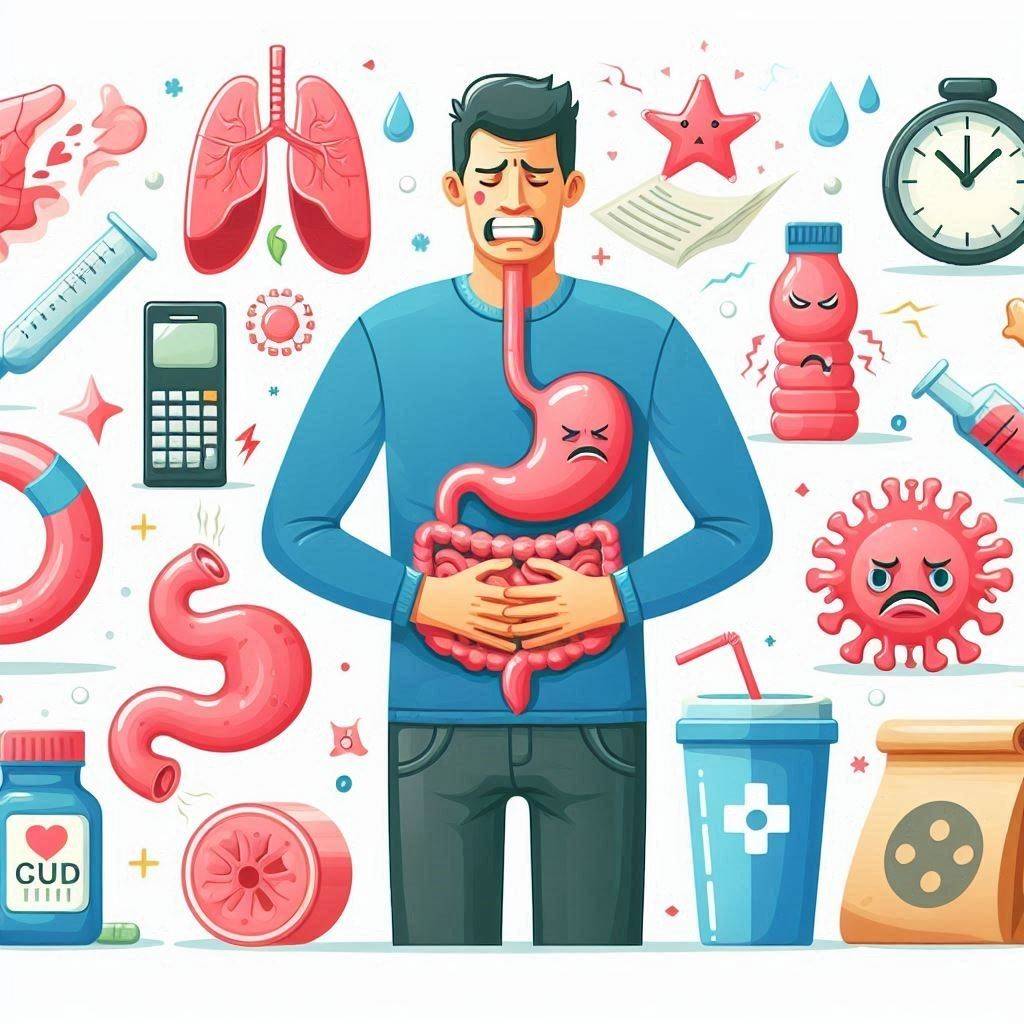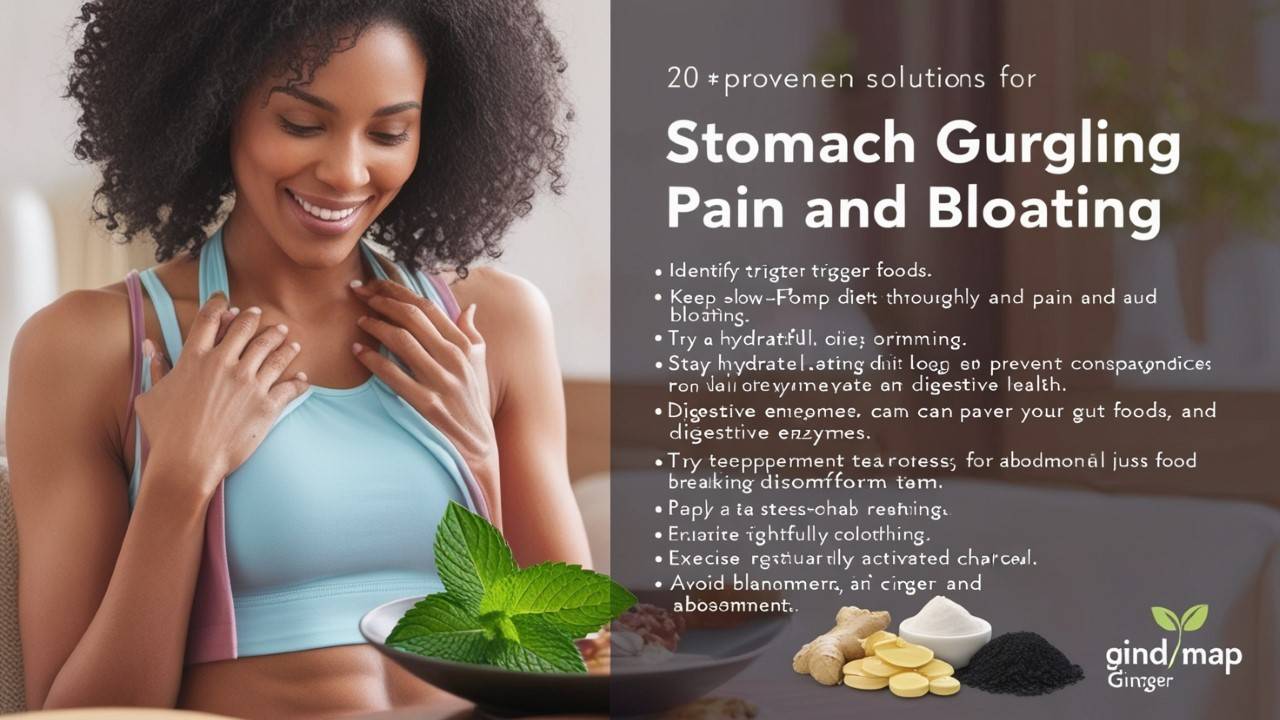Stomach Gurgling Pain and Bloating: 15 Causes and 20 Proven Solutions
Discover the causes of stomach gurgling pain and bloating, plus effective solutions. Learn when to seek medical help and how to find relief fast.
Quick Summary:

Stomach gurgling with pain and bloating often results from:
- Gas buildup
- Food intolerances
- Digestive disorders
Quick relief:
- Try peppermint tea
- Apply a warm compress
- Practice deep breathing
See a doctor if symptoms persist or worsen.
Have you ever experienced that uncomfortable combination of stomach gurgling pain and bloating? You’re not alone. As someone who’s dealt with these issues personally and helped countless others find relief, I’m here to guide you through the causes and solutions for this common yet distressing problem.
Understanding Stomach Gurgling Pain and Bloating
Before we dive into the causes and solutions, let’s break down what we mean by stomach-gurgling pain and bloating:
- Stomach gurgling: Also known as borborygmi, these are the rumbling noises your stomach makes.
- Pain: This can range from mild discomfort to sharp sensations.
- Bloating: A feeling of fullness or swelling in your abdomen.
When these symptoms occur together, it can be particularly uncomfortable and even disruptive to your daily life.
15 Common Causes of Stomach Gurgling Pain and Bloating

Let’s explore the potential culprits behind your discomfort:
- Excessive Gas: Sometimes, the simplest explanation is the correct one. Excess gas in your digestive system can cause both gurgling sounds and bloating.
- Food Intolerance: Lactose intolerance or gluten sensitivity can lead to stomach gurgling pain and bloating.
- Irritable Bowel Syndrome (IBS): This common disorder can cause a range of digestive symptoms, including stomach gurgling pain and bloating.
- Inflammatory Bowel Disease (IBD): Conditions like Crohn’s disease or ulcerative colitis can cause chronic inflammation and digestive issues.
- Gastroesophageal Reflux Disease (GERD): Acid reflux can sometimes cause bloating and stomach discomfort.
- Constipation: When stool builds up in your colon, it can lead to bloating and discomfort.
- Overeating: Consuming enormous meals can stretch your stomach and lead to bloating.
- Eating Too Quickly: Swallowing air while eating can increase gas in your digestive system.
- Carbonated Beverages: These drinks introduce extra gas into your system.
- Stress and Anxiety: Your gut and brain are closely connected, and stress can manifest as digestive symptoms.
- Hormonal Changes: Many women experience bloating and digestive changes during their menstrual cycle.
- Gastroparesis: This condition slows down the movement of food from your stomach to your small intestine.
- Small Intestinal Bacterial Overgrowth (SIBO): An abnormal increase in bacteria in your small intestine can cause bloating and discomfort.
- Celiac Disease: This autoimmune disorder triggered by gluten can cause a range of digestive symptoms.
- Certain Medications: Some drugs, particularly antibiotics, can disrupt your gut flora and cause digestive issues.
20 Proven Solutions for Stomach Gurgling Pain and Bloating

Now that we understand the potential causes, let’s explore effective solutions:
- Identify Trigger Foods: Keep a food diary to pinpoint which foods might be causing your stomach gurgling pain and bloating.
- Try a Low-FODMAP Diet: This diet eliminates certain fermentable carbohydrates that can cause digestive issues.
- Practice Mindful Eating: Slow down, chew thoroughly, and pay attention to your meals.
- Stay Hydrated: Drinking enough water can help prevent constipation and support overall digestive health.
- Incorporate Probiotics: These beneficial bacteria can help balance your gut flora.
- Use Digestive Enzymes: These supplements can aid in breaking down food more effectively.
- Try Peppermint Tea: Peppermint has natural antispasmodic properties that can soothe digestive discomfort.
- Apply a Warm Compress: Heat can help relax your abdominal muscles and ease discomfort.
- Practice Stress-Reduction Techniques: Try meditation, deep breathing, or yoga to manage stress-related digestive issues.
- Exercise Regularly: Physical activity can help stimulate digestion and reduce bloating.
- Avoid Tight Clothing: Tight waistbands can put pressure on your abdomen and exacerbate bloating.
- Try Ginger: This root has natural anti-inflammatory properties that can aid digestion.
- Consider Activated Charcoal: This supplement may help absorb excess gas in your digestive system.
- Massage Your Abdomen: Gentle massage can help stimulate digestion and relieve gas.
- Avoid Chewing Gum: Chewing gum can increase the amount of air you swallow.
- Try Herbal Bitters: These can help stimulate digestive enzymes and improve overall digestion.
- Consider Acupuncture: Some people find relief from digestive issues through this traditional Chinese medicine practice.
- Use Essential Oils: Certain oils like fennel or peppermint may help soothe digestive discomfort when used properly.
- Try Intermittent Fasting: Giving your digestive system regular breaks can sometimes help alleviate chronic digestive issues.
- Seek Professional Help: If your symptoms persist, consult a gastroenterologist for personalized treatment.
When to see a doctor
While occasional stomach gurgling pain and bloating are normal, there are times when you should seek medical attention:
- Persistent symptoms lasting more than a few days
- Severe pain or discomfort
- Unexplained weight loss
- Blood in your stool
- Frequent vomiting
- Difficulty swallowing
Frequently Asked Questions
Why is my stomach so bloated and gurgling?
Stomach gurgling pain and bloating can occur because of various reasons, including gas buildup, food intolerances, or digestive disorders. It’s often the result of your digestive system processing food and moving contents through your intestines. If the symptoms are frequent or severe, it’s best to consult with a healthcare provider for a proper diagnosis.
Why is my stomach gurgling and hurting?
When your stomach gurgles and hurts, it’s often because of gas moving through your digestive system or your intestines contracting to move food along. This can be accompanied by pain if there’s inflammation, food sensitivities, or other underlying digestive issues. Stomach gurgling pain and bloating can also be exacerbated by stress or certain foods.
What does it mean when your stomach hurts and bubbles?
The bubbling sensation in your stomach, often accompanied by pain, is typically caused by gas moving through your digestive tract. This can be a normal part of digestion, but if it’s frequent or accompanied by stomach gurgling pain and bloating, it could indicate food intolerances, IBS, or other digestive disorders.
When should I be worried about stomach noises?
While occasional stomach noises are normal, you should be concerned if:
- The noises are accompanied by persistent pain or severe stomach gurgling pain and bloating
- You experience significant changes in bowel habits
- You notice blood on your stool
- You have unexplained weight loss
- The symptoms interfere with your daily life
In these cases, it’s important to seek medical advice for proper evaluation and treatment.
Conclusion
Dealing with stomach gurgling pain and bloating can be frustrating, but armed with this knowledge, you’re now better equipped to manage your symptoms and know when to seek help. Remember, everyone’s digestive system is unique, so what works for one person may not work for another. Be patient with your body and don’t hesitate to consult a healthcare professional if you have ongoing concerns.
Thank you for reading this comprehensive guide. I hope it helps you find relief and better understand your digestive health.
Recommended Reading
- How to Heal Your Gut: Enhancing Your Digestive Health
- Calm the Storm: 19 Powerful Stress Reduction Techniques
- 20 Eating Healthy Habits: Your Path to Lasting Health
[

Adel Galal is a health and wellness writer with over 30 years of experience studying and writing about health, fitness, nutrition, and healthy living. He is the founder of NextFitLife.com, where he shares practical, evidence-based guidance to support long-term health at any age. Adel’s mission is simple:
to help people make smarter health choices that fit real life, at any age.



